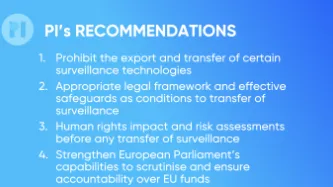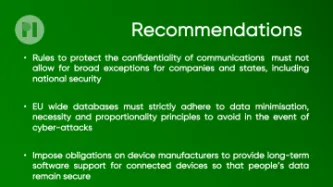Search
Content type: Report
In the months following the beginning of the Covid-19 pandemic, more than half the world’s countries enacted emergency measures. With these measures came an increase in executive powers, a suspension of the rule of law, and an upsurge in security protocols – with subsequent impacts on fundamental human rights. Within this broader context, we have seen a rapid and unprecedented scaling up of governments’ use of technologies to enable widespread surveillance. Surveillance technologies exacerbated…
Content type: Advocacy
PI Opening Statement at PEGA Hearing on "Spyware used in third countries and implications for EU foreign relations"
Thank you very much for offering me the opportunity to give evidence before this Committee for another time on behalf of Privacy International (or PI) – a London-based non-profit that researches and advocates globally against government and corporate abuses of data and technology.
My opening statement will first briefly touch on the EU foreign policy’s priorities. I will…
Content type: Explainer
What is SMS
SMS - or Short Messaging Service - refers to the widespread messaging service that virtually any of us will be familiar with. This refers to the first form of texting available on mobile phones, which makes use of cellular phone service - not to be confused with more modern instant messaging services making use of the internet instead (iMessage, Whatsapp, Signal ...). This explainer aims to give an overview of the technology, and some of its limitations in today's context and after…
Content type: Long Read
The defense and protection of the environment continues to come at a high cost for activists and human rights defenders. In 2021, the murders of environment and land defenders hit a record high. This year, a report by Global Witness found that more than 1,700 environmental activists have been murdered in the past decade.
While the issue of surveillance of human rights defenders has received attention, evidence of the surveillance of environmental activists keeps mounting, with recent examples…
Content type: Long Read
Last update: 26 April 2023
In 2022, Privacy International continues to produce real change by challenging governments and corporations that use data and technology to exploit us.
We know life moves quickly. So, we wanted to keep you in the loop and ensure you don’t miss out on how we’re changing the world for the better.
That’s why we’ve created this highlight reel of our wins in the past year.
Take a look below!
PS: To continue to do this, and more, into 2023, we need your support. We…
Content type: Advocacy
The European Union Artificial Intelligence Act (AI Act) will regulate the development and use of ‘high-risk’ AI, and aims to promote the uptake of ‘trustworthy AI’ whilst protecting the rights of people affected by AI systems.
However, in its original proposal, the EU AI Act does not adequately address and prevent the harms stemming from the use of AI in the migration context. Whilst states and institutions often promote AI in terms of benefits for wider society, for marginalised communities,…
Content type: Advocacy
We, the undersigned organisations, seek to draw your attention to aspects of the draft Corporate Sustainability Due Diligence Directive (the Directive), and its application to the use of technology and the technology sector, which require strengthening if the Directive is to realise its full potential in respect of this critical global sector that is today responsible for some of the most egregious human rights harms.
The technology and surveillance industries have ushered in an entirely new…
Content type: Press release
The decision by the EU’s oversight body follows a year-long inquiry prompted by complaints outlining how EU bodies and agencies are cooperating with governments around the world to increase their surveillance powers filed by Privacy International, Access Now, the Border Violence Monitoring Network, Homo Digitalis, International Federation for Human Rights (FIDH), and Sea-Watch.The complainants welcome the decision by the European Ombudsman and call on the Commission to urgently review its…
Content type: Long Read
In the UK, successive government ministers and members of parliament have made emotive proclamations about the malaise of "public sector fraud".
This year, former Work and Pensions Secretary Therese Coffey said that the welfare system "is not a cash machine for callous criminals and it’s vital that the government ensures money is well spent...[and] fraud is an ever-present threat."
In 2013, the UK's minister for the disabled made numerous claims that there were "vast numbers of bogus disabled […
Content type: Long Read
Since early 2021, PI have been investigating and challenging the latest stride in the UK’s cruel migration policies: the roll-out of GPS ankle tags to monitor migrants released on immigration bail, a dehumanising, invasive method of control that monitors and records people’s precise location 24/7.
More recently, we found out through Freedom of Information Requests that the Home Office is working to roll out "smartwatches" - devices that also record 24/7 location data, but instead of being…
Content type: Advocacy
Privacy International (PI) notes the conceptual zero draft of the WHO’s Pandemic prevention, preparedness, and response accord (“WHO CAII”). PI has sought to closely follow and engage with the discussions leading up to the draft CAII, despite the significant limitations to civil society participation in the process. In September 2022 we submitted our observations to the working draft of the WHO CAII. This analysis builds upon those observations.
Broadly, PI welcomes the content of the…
Content type: News & Analysis
In a judgment of 14 October 2022, the UK High Court ordered the UK Home Office to provide remedy to the thousands of migrants affected by its unlawful policy and practice of seizing mobile phones from people arriving by small boats to UK shores.
The availability and spread of new technologies, and the exponential amounts of data they generate, are regularly being abused by governments to surveil and control people - but these new forms of surveillance are only starting to make their way through…
Content type: Advocacy
We submitted a report to the Commission of Jurists on the Brazilian Artificial Intelligence Bill focussed on highlighting the potential harms associated with the use of AI within schools and the additional safeguards and precautions that should be taken when implementing AI in educational technology.The use of AI in education technology and schools has the potential to interfere with the child’s right to education and the right to privacy which are upheld by international human rights standards…
Content type: Long Read
Introduction
India’s educational system is the largest in the world, with over 250 million students, 50% of whom attend publicly administered schools.
The autonomy given by the Indian Constitution to the 28 states and 8 union territories means that the right to education is implemented quite differently in each one, respecting culture, language, and other local specificities. Educational policies are suggested at the national level by various autonomous agencies and states can implement them in…
Content type: Examples
Ohio teenager Aaron Ogletree has won a lawsuit he filed against Cleveland State University after he was required to pan a webcam around his bedroom to eliminate possible cheating before taking a remote exam.
The court agreed that Ogletree's Fourth Amendment rights were violated by the scanning requirement, which briefly exposed tax documents and medications. The university has filed an appeal and in the meantime has told students that they will not be permitted to take remotely proctored…
Content type: Examples
US parents have reported receiving an explicit and deliberately shocking image after hackers attacked the primary school learning app Seesaw. Seesaw has 10 million users, who include teachers, students, and family members. The company said the hackers had not gained administrative access, but had accessed individual accounts via compromised email addresses and passwords that had been reused across services.
https://www.bbc.co.uk/news/technology-62914010
Writer: BBC
Publication: BBC
Content type: Examples
At least 37 US colleges and universities, as well as numerous school district, have repurposed Social Sentinel (recently renamed Navigate360 Detect) to help campus police surveil student protests. The software is marketed as a safety tool that can scan students' social media posts and university email accounts to identify those who are at risk of harming themselves or others; adoption in schools has been fuelled by shootings. For public colleges, this use of the software creates a conflict…
Content type: Examples
The 32-year-old Americans with Disabilities Act is failing to protect neurodivergent students from school monitoring and risk assessment software that treats any divergence from stereotypically "normal" behaviour as a harm to both the students themselves and others. Remote proctoring software penalises those who need psychological help, flag "suspicious" movements such as looking away from the screen during a test, and makes no provision for disabled students' special needs. These problems are…
Content type: Examples
In a 2010 case, the Lower Merion school district in suburban Philadelphia school district agreed to pay $610,000 to settle two lawsuits brought by students who had discovered that the webcams attached to their school-issued laptops had secretly taken hundreds of photographs of them in their homes along with hundreds of screen shots. In one of the cases, a teenaged boy was accused of popping pills; in fact, he was eating jelly beans.
https://www.wired.com/2010/10/webcam-spy-settlement/
Writer…
Content type: Examples
Even though schools are back in session in person, their teachers can still monitor the screens on their school-issued devices via software such as GoGuardian. In a new report from the Center for Democracy and Technology, 89% of teachers say their schools will continue to use student-monitoring software, up from 84% in 2021, raising worries about how the data will be used in a climate increasingly hostile towards abortion and LGBTQ+ issues.
CDT also reports that 44% of teachers say that at…
Content type: Examples
A new report from the education news site The 74 Million finds that in-school digital surveillance programs are flagging LGBTQ+ content as "pornographic". For example, Gaggle, comprehensive monitoring software implemented in the Minneapolis public school system, has led administrators to notify parents that their children's submissions have been flagged, without context, for mentioning suicide, gay, and lesbian. Democratic senators Elizabeth Warren (D-MA), Ed Markey (D-MA), and Richard…
Content type: Examples
Following the US Supreme Court's Dobbs decision that paved the way for states to enact legislation criminalising abortion, health advocates warn that the surveillance software schools use to algorithmically monitor students' messages and search terms could be weaponised against teens looking for reproductive health care. These systems can automatically alert school administrators, parents, or police when they detect "dangerous behaviour", which may include anything from imminent suicide…
Content type: Examples
The Welsh Local Government Association is collaborating with the Centre for Digital Public Services on an 8-to-12-week discovery project to help local authorities to understand schools' requirements for information management systems and understand the market offerings in order to formulate a needs-based procurement specification. The project is intended to produce a shared set of core requirements and will look at user need for establishing one or more core datasets, individual schools'…
Content type: Examples
During a remotely proctored online exam, a number of students on the Bar Professional Training Course urinated in bottles and buckets and wore adult diapers rather than risk the possibility that their exam would be terminated if they left their screens long enough to go to the toilet. The Bar Standards Board responded to the story by saying that students are warned in advance that they will not be able to leave the room during an online exam and that they should take the exam in a test centre…
Content type: Examples
In September 2022, the UK Department for Education announced that under a £270,000 contract with Suffolk-based Wonde Ltd it would collect data on children's school attendance and potentially share it with other government departments and third parties as part of its drive to raise attendance. A visualisation tool will create an interactive national attendance dashboard to run alongside the publication of fortnightly attendance data that the DfE says will provide "ongoing transparency". LSE…
Content type: Examples
Intel, in partnership with the software company Classroom Technologies, has developed an AI facial analysis system ("Class") by training an algorithmic model based on labels psychologists applied to the emotions they could detect in videos of students in real-life classrooms. The software is intended to help teachers get feedback from students in online classrooms and warn if the students are bored or confused; critics worry the system could threaten student privacy and damage teacher-student…
Content type: Advocacy
PI Opening Statement at PEGA Hearing on "Spyware and ePrivacy"
[check against delivery]
Thank you very much for offering us the opportunity to give evidence before this Committee for a second time.
Privacy International (PI) is a London-based non-profit that researches and advocates globally against government and corporate abuses of data and technology. For years we have been tracking the surveillance industry, challenging unlawful surveillance before national courts as well as the Court of…
Content type: Press release
The European Ombudswoman, Emily O’Reilly, has launched two new investigations into Frontex, the European Border and Coast Guard Agency, and into the European External Action Service (EEAS), the EU’s diplomatic agency, in relation to their support to non-EU countries to develop surveillance capabilities and, in particular, their lack of prior human rights risk and impact assessments.
The investigations, opened on 5 October 2022, come in response to complaints filed by Privacy International,…
Content type: Advocacy
UPDATES:The Platform Work Directive (PWD) became law in October 2024. Member States have until December 2026 to implement its provisions into their national law. The final text of the PWD provides the following:A person performing platform work cannot be fired or suspended based on a decision made by an algorithm or automated decision-making systems.Platforms must provide upfront information, in "clear and plain language", about their use of automated decision-making systems.Platform workers…
Content type: Video
Please note this podcast was recorded before Sebastian and Netzpolitik were able to talk to PimEyes CEO Gobronidze in person.
Links
Find more from Sebastian
More of Netzpolitik's work on PimEyes
PI's work on facial recognition
Our work on Clearview

















